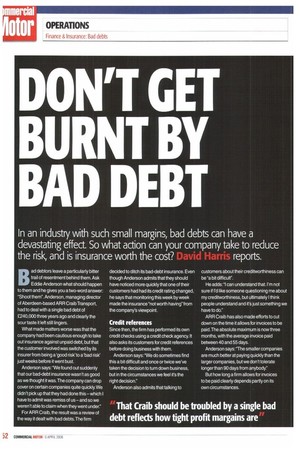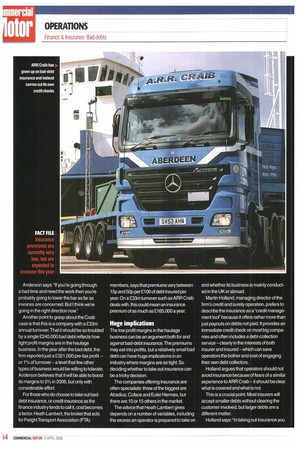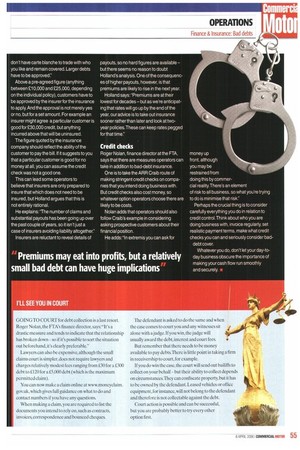DON'T GET BURNT BY BAD DEBT
Page 52

Page 54

Page 55

If you've noticed an error in this article please click here to report it so we can fix it.
In an industry with such small margins, bad debts can have a devastating effect. So what action can your company take to reduce
the risk, and is insurance worth the cost? Liam Harris reports.
Bad debtors leave a particularly bitter trail of resentment behind them Ask Eddie Anderson what should happen to them and he gives you a two-word answer: "Shoot them". Anderson, managing director of Aberdeen-based AR R Craib Transport, had to deal with a single bad debt of
240,000 three years ago and clearly the sour taste it left still lingers.
What made matters worse was that the company had been cautious enough to take out insurance against unpaid debt, but that the customer involved was switched by its insurer from being a 'good risk' to a 'bad risk' just weeks before it went bust.
Anderson says: We found out suddenly that our bad-debt insurance wasn't as good as we thought it was. The company can drop cover on certain companies quite quickly. We didn't pick up that they had done this— which I have to admit was remiss of us—and so we weren't able to claim when they went under."
For ARR Craib, the result was a review of the way it dealt with bad debts.The firm decided to ditch its bad-debt insurance. Even though Anderson admits that they should have noticed more quickly that one of their customers had had its credit rating changed, he says that monitoring this week by week made the insurance "not worth having" from the company's viewpoint
Credit references
Since then, the firm has performed its own credit checks using a credit check agency. It also asks its customers for credit references before doing business with them.
Anderson says: "We do sometimes find this a bit difficult and once or twice we've taken the decision to turn down business, but in the circumstances we feel it's the right decision."
Anderson also admits that talking to customers about their creditworthiness can be "a bit difficult.
He adds."I can understand that. I'm not sure it'd like someone questioning me about my creditworthiness, but ultimately I think people understand and it's just something we have to do."
AR R Craib has also made efforts to cut down on the time it allows for invoices to be paid The absolute maximum is now three months, with the average invoice paid between 40 and 55 days Anderson says: "The smaller companies are much better at paying quickly than the larger companies. but we don't tolerate longer than 90 days from anybody."
But how long a firm allows for invoices to be paid clearly depends partly on its own circumstances Anderson says If you're going through a bad time and need the work then you're probably going to lower the bar as far as invoices are concerned But I think we're going in the right direction now" Another point to grasp about the Craib case is that this is a company with a £33m annual turnove r. That it should be so troubled by a single £240.000 bad debt reflects how tight profit margins are in the haulage business In the year after the bad debt, the firm reported just a £321,000 pre-tax profit — or 1`. of turnover — a level that few other types of business would be willing to tolerate. Anderson believes that it will be able to boost as margins to 5°0 in 2006. but only with considerable effort For those who do choose to take out baddebt insurance, or credit insurance as the finance industry tends to call a, cost becomes a factor. Heath Lambert, the broker that acts for Freight Transport Association (FTA) members, says that premiums vary between 15p and 50p per £100 of debt insured per year. On a £33m turnover such as ARA Craib deals with, this could mean an insurance premium of as much as £165,000 a year.
Huge implications
The low profit margins in the haulage business can be an argument both for and against bad-debt insurance.The premiums may eat into profits, but a relatively small bad debt can have huge implications in an industry where margins are so tight. So deciding whether to take out insurance can be a tricky decision The companies offering insurance are often specialists. three of the biggest are Atradi us, Coface and Euler Hermes, but there are 10 or 15 others in the market.
The advice that Heath Lambert gives depends on a number of variables, including the excess an operator is prepared to take on and whether its business is mainly conducted in the UK or abroad.
Martin Holland, managing director of the firm's credit and surely operation, prefers to describe the insurance as a "credit management tool" because it offers rather more than just payouts on debts not paid. It provides an immediate credit check on most big companies and often includes a debt-collection service —clearly in the interests of both insurer and insured—which can save operators the bother and cost of engaging their own debt collectors.
Holland argues that operators should not avoid insurance because of fears of a similar experience to ARR Craib — it should be clear what is covered and what is not.
This is a crucial point. Most insurers will accept smaller debts without clearing the customer involved, but larger debts are a different matter.
Holland says: "I n taking out insurance you don't have carte blanche to trade with who you like and remain covered. Larger debts have to be approved."
Above a pre-agreed figure (anything between £10,000 and £25,000, depending on the individual policy), customers have to be approved by the insurer for the insurance to apply. And the approval is not merely yes or no, but for a set amount. For example an insurer might agree a particular customer is good for 230,000 credit, but anything incurred above that will be uninsured.
The figure quoted by the insurance company should reflect the ability of the customer to pay the bill. If it suggests to you that a particular customer is good for no money at all, you can assume the credit check was not a good one.
This can lead some operators to believe that insurers are only prepared to insure that which does not need to be insured, but Holland argues that this is not entirely rational.
He explains:'The number of claims and substantial payouts has been going up over the past couple of years, so it isn't just a case of insurers avoiding liability altogether."
Insurers are reluctant to reveal details of payouts, so no hard figures are available but there seems no reason to doubt Holland's analysis. One of the consequences of higher payouts, however, is that premiums are likely to rise in the next year.
Holland says: "Premiums are at their lowest for decades but as we're anticipating that rates will go up by the end of the year, our advice is to take out insurance sooner rather than later and look at twoyear policies. These can keep rates pegged for that time."
Credit checks Roger Nolan, finance director at the FTA, says that there are measures operators can take in addition to bad-debt insurance
One is to take the ARR Craib route of making stringent credit checks on companies that you intend doing business with. But credit checks also cost money, so whatever option operators choose there are likely to be costs.
Nolan adds that operators should also follow Crab's example in considering asking prospective customers about their financial positron.
He adds:"In extremis you can ask for money up front, although you may be restrained from doing this by commer cial reality. There's an element
of risk to all business, so what you're trying to do is minimise that risk?'
Perhaps the crucial thing is to consider carefully everything you do in relation to credit control.Think about who you are doing business with, invoice regularly, set realistic payment terms, make what credit checks you can and seriously consider baddebt cover.
Whatever you do, don't let your day-today business obscure the importance of making your cash flow run smoothly and securely. ix
































































































































































































